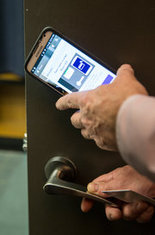
“A lot of our members are saying, ‘I want to skip the front desk,’ ” said Geraldine Calpin, senior vice president and Hilton’s global head of digital. “It’s superefficient,” he said. “Hold up your iPhone and, zoom, you’re in.” Hotels say their research tells them that the prospect of being able to skip line at front desk is appealing to business travelers, well any traveler really.
“I’ve stayed in a lot of hotels where, at the end of the day, you’re tired and you’re waiting in line,” Mr. Monk said. Being able to go straight to his room saved him time and hassle, he said. “It made everything a lot easier.”
Starwood offering smartphone key apps at 10 hotels in its Aloft, Element and W hotel brands, including 5 in US.
Hyatt Hotels and Resorts started testing mobile keys at 1 hotel in New York City. Pilot expected to conclude early 2015. This quarter,
Hilton Worldwide starting test of mobile keys at 10 hotels in US, a project expects to finish early 2015. By middle of 2015, loyalty program members in US visiting Hilton, Waldorf-Astoria, Conrad and Canopy by Hilton brands will be able to use phones as keys.
Source: http://www.nytimes.com/2014/11/04/business/hotels-test-turning-guests-smartphonoes-into-room-keys-.html
CKB Solutions is all about real solutions for the real world. To learn how we can help your business, contact Greg Kovacic in Hong Kong.




 RSS Feed
RSS Feed
